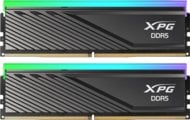60points
G.Skill Trident Z5 RGB DDR5-7200 CL34 32GB (2x16GB)

vs
G.Skill Trident Z5 RGB DDR5-7200 CL34 32GB (2x16GB) review: specs and price
G.Skill Trident Z5 RGB DDR5-7200 CL34 32GB (2x16GB)
Why is G.Skill Trident Z5 RGB DDR5-7200 CL34 32GB (2x16GB) better than the average?
- True latency?
9.44 nsvs11.7 ns - Memory speed (Tested Speed)?
7200vs4570.36 - Memory speed (SPD)?
4800 MHzvs3552.95 MHz - DDR memory version?
5vs4.5 - Voltage?
1.4Vvs1.3V
Which are the most popular comparisons?
Price comparison
G.SKILL Trident Z5 RGB Series (Intel XMP 3.0) DDR5 RAM 32GB (2x16GB) 7200MT/s CL34-45-45-115 1.40V Deskto...G.SKILL Trident Z5 RGB Series (Intel XMP 3.0) DDR5 RAM 32GB (2x16GB) 7200MT/s CL34-45-45-115 1.40V Desktop Computer Memory UDIMM (F5-7200J3445G16GX2-TZ5RK)
Cheap alternatives for G.Skill Trident Z5 RGB DDR5-7200 CL34 32GB (2x16GB)
User reviews
Performance
true latency
9.44 ns
The true latency is a good indicator of memory performance. It is calculated from the CAS latency (CL) and transfer rate.
The speed of the memory, as given by the manufacturer. Also known as the Tested Speed. Note: it requires a CPU/motherboard that can support the speed, and may also require enabling XMP profiles.
memory speed (SPD)
4800 MHz
The SPD (serial presence detect) speed of the memory. This is the speed that the memory runs at by default, without changing any BIOS settings or overclocking etc.
DDR (Double Data Rate) memory is the most common type of RAM. Newer versions of DDR memory support higher maximum speeds and are more energy-efficient.
The CAS Latency (CL) timing of the memory.
tRAS timing
115
The tRAS (Row Active Time) timing of the memory.
The tRCD (Row Column Delay) timing of the memory.
The tRP (Row Precharge Time) timing of the memory.
General info
form factor
288-pin DIMM
You should always make sure to buy the correct memory for your system. Common form factors include 288-pin DIMM for PCs and 260-pin SO-DIMM for laptops.
memory size (total)
2 x 16GB
The total size of the memory, taking into account the size of a single module and the number of modules in the kit.
has Samsung B-Die
✖G.Skill Trident Z5 RGB DDR5-7200 CL34 32GB (2x16GB)
Samsung B-Die is a specific type of die (chip) used in some memory products. Many people favour this type of memory as it can run at speeds of 3200MHz or higher while also keeping CAS latency low (CL 14). These performance benefits are most notable when paired with an AMD Ryzen CPU.
voltage
1.4V
The voltage of the memory.
height
42 mm
The height represents the vertical dimension of the product.
memory size
16GB
The size of a single memory module.
Features
Intel XMP / AMD EXPO
Intel XMP 3.0
Intel XMP (Intel Extreme Memory Profile) and AMD EXPO (AMD Extended Profiles for Overclocking) are features that allow you to easily overclock memory, simply by enabling the option in the BIOS.
Supports ECC memory
✖G.Skill Trident Z5 RGB DDR5-7200 CL34 32GB (2x16GB)
Error-correcting code memory can detect and correct data corruption. It is used when is it essential to avoid corruption, such as scientific computing or when running a server.
Has an integrated heatsink
✔G.Skill Trident Z5 RGB DDR5-7200 CL34 32GB (2x16GB)
Heat can have an impact on performance and reduce potential read/write speeds. An integrated heatsink (or heat spreader) helps to keep the component cool and operating at maximum efficiency.
has RGB lighting
✔G.Skill Trident Z5 RGB DDR5-7200 CL34 32GB (2x16GB)
RGB lighting allows you to choose between millions of colors and customize the look of your PC components.
Benchmarks
PassMark result (latency)
Unknown. Help us by suggesting a value.
The PassMark benchmark tests several factors related to memory's performance. The latency test measures how quickly a byte of memory is transferred to the CPU, with lower values indicating faster performance. Source: PassMark.
PassMark result (read uncached)
Unknown. Help us by suggesting a value.
The PassMark benchmark tests several factors related to memory's performance. The read uncached test measures how quickly a large block of memory can be read, with higher values indicating faster performance. Source: PassMark.
PassMark result (write)
Unknown. Help us by suggesting a value.
The PassMark benchmark tests several factors related to memory's performance. The write test measures how quickly a block of memory can be written, with higher values indicating faster performance. Source: PassMark.
UserBenchmark result (average %)
Unknown. Help us by suggesting a value.
The average benchmark result from UserBenchMark, based on multi-core throughput, single-core throughput, and latency. Source: UserBenchmark.
Share
Which are the best memory?
This page is currently only available in English.


































No reviews yet
Be the first. Use your experience to help others in the community make a decision.
Write a review